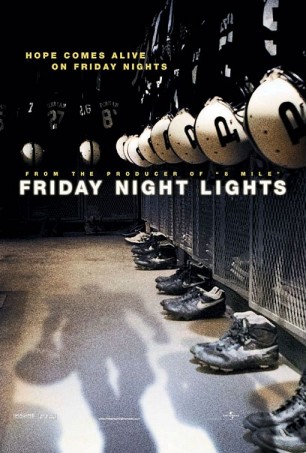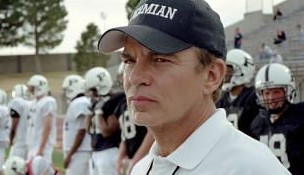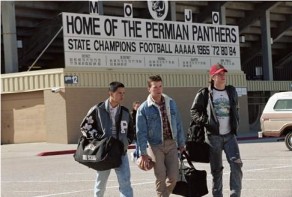|
Friday
Night Lights
In Texas, the
Lord rested on the seventh day, just like everybody else.
He had to, because on the fifth day He'd pretty much worn
Himself out creating football. Out of the darkness he commanded,
"let there be stadium lights!" And it was good.
Perhaps that's
not the way they teach it in Texas, but it doesn't seem
that much of a stretch. Though football has a hold on the
American popular culture in general, the Lone Star State
has elevated it into something beyond passion. Friday
Night Lights offers a case in point: the small town
of Odessa, Texas, where football has a religious feel. Older
citizens stop and offer ritualized greetings to high school
players; the words never change and they're all tantamount
to worshiping youth and pigskin. As long as they win, amen.
Based on a true
story and partially shot as if it were a documentary, Friday
Night Lights quickly draws you into the monomaniacal
world of this economically depressed town, and more impressively,
makes you understand it. It's not just a case of "nothing
else to do," though director Peter Berg doesn't offer much
alternative. It's the culture. On a scorching summer day,
the Permian High Panthers meet for grueling practice, and
already the media has descended upon them.
The Permian
Panthers have been state champions four times, and in Texas,
that covers a lot of ground. This year (1987) might be the
fifth championship year, centering on an already hot college
recruitment target, running back Boobie Williams (Derek
Luke). Another receiver, Don Billingsley (Garrett Hedlund),
is the son of a state champion, billed by even the out-of-town
reporters as "a living legend." Though dad Charles Billingsley
(Tim McGraw) never achieved anything past high school,
his shadow looms large over the team, especially with the
glint of that championship ring.
Of course, a
football team achieves nothing without its quarterback.
Berg keeps Mike Winchell (Lucas Black) front and center,
but also lets him be the most impenetrable character. Rarely
smiling, though not necessarily unhappy, Mike is the first
player we meet, getting drilled on football plays by his
mother (Connie Cooper) over breakfast. Though the connection
never gets made explicitly, it's quite possible that her
mania for football has driven her insane. At any rate, the
script keeps referring back to "her problems," and all we
really see about it is a drive to see her son be the best
quarterback he can be.
All the players
have one goal beyond championship: to get out of this small
town. Maybe that's the key to the game's popularity, but
the preponderance of older guys walking around with those
rings belie the students' dreams.
Tying
it all together in a low-key star turn, Billy Bob Thornton
plays coach Gary Gaines. How does this strange, strange
actor play normalcy so effectively?
A PG-13
rating requires Gaines to speak less saltily than he likely
did in real life, but Thornton still invests the part with
complexity. By turns fiery and fatherly to his players,
Gaines knows when to keep his mouth shut and nod politely
when it seems like everybody in town has advice for
him. Last year's Radio gave us a glimpse of this,
but for melodramatic purposes. Here, it's everyday life,
and because of Berg's tendency to keep a distance from the
characters, we conversely feel more for Gaines.
The slightest
downturn in fortune for the team, which of course there
are, has townspeople calling for him to be fired. Even on
his way to the playoffs, Gaines' young daughter asks plaintively,
"are we going to have to move again?"
For the most
part, Friday Night Lights has the edge of reality
to it. Many characters remain as unknowable as the guy down
the street. You recognize their faces and their quirks,
but whatever drives them takes a backseat to football; even
knowing how their lives turned out afterward in subtitles
feels like an intrusion. In a few cases the script, also
by Berg with David Aaron Cohen, stops to try to redeem some
moments, particularly McGraw's drunken has-been. Those scenes
feel trite, even though well-acted.
If anything
takes you out of the movie, it is the scenes that lose the
documentary feel. Berg, already proven as an interesting
director with The Rundown and Very Bad Things,
is at his best here when he keeps his distance. The film
never resorts to talking heads, but we learn much more as
a fly on the wall than watching something with a bit of
schmaltz to it. His script is one of those rare smart works
that lets more be spoken by what is not said.
And then there's
the action on the playing field. Bone-crunching (okay, tendon-spraining),
visceral and strangely emotional, it's so well done that
even if you think you do not like the game, your heart will
pound.
Are you ready for some football?
Rating: 
|








